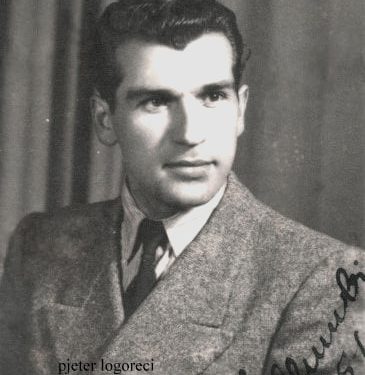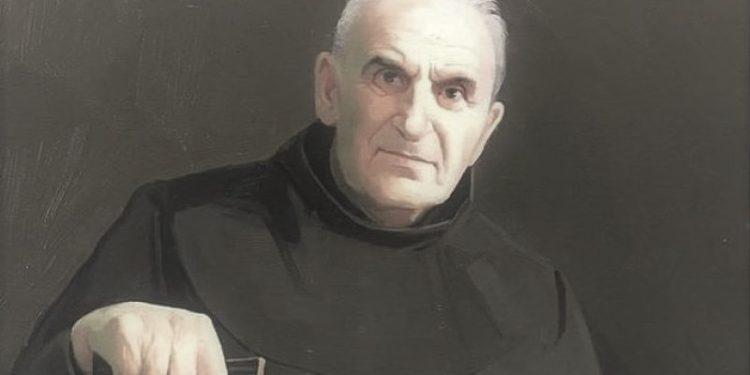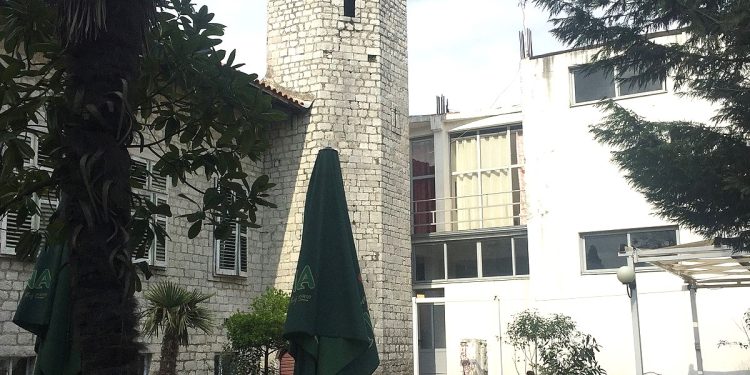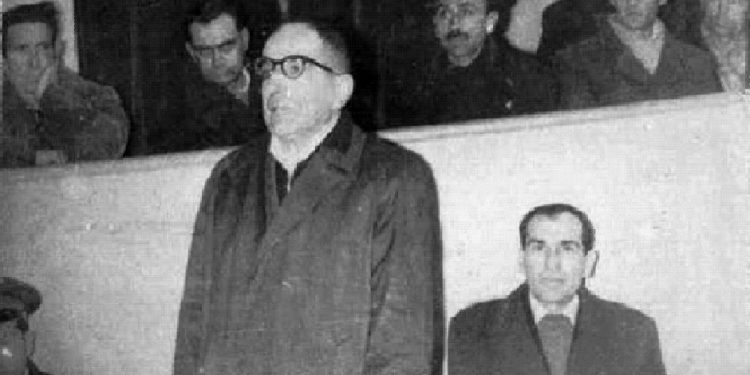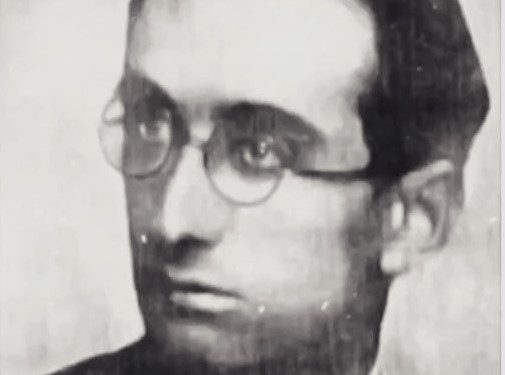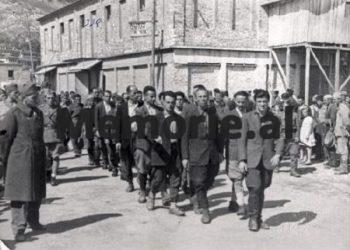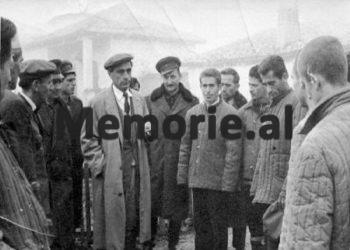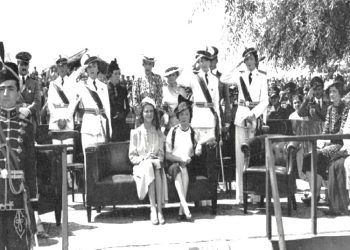From Father Zef Pllumi
WORK IN THE MUSEUM
Memorie.al / The museum in Shkodër were located at the English Clock Tower. It was called that because, it was said that it was built in the early 19th century by an Englishman, whom Shkodra called Lord Padget. The complex consisted of the clock tower, the residential building, and the courtyard door (the surrounding wall). The door was the most beautiful in terms of architecture: a monumental work in the Arabic style, entirely of carved stone. It had the bad luck of being on the road. The volunteer partisans had a slogan: “No obstacle shall stop us,” so they overcame every obstacle: they attacked it and tore it down to the foundations, instead of leaving it there, as an architectural monument, like a triumphal arch in the middle of the road, with its beautiful Arabic style. With its carved stones, they paved the cobblestone street.
The objects of the historical archaeological museum had been taken from the collection of Father Shtjefën Gjeçov (the Franciscan Museum) and the other part, from the collection of the Jesuits. I want to note that around the beginning of April 1945, Mehmet Shehu, after having destroyed Kelmendi with fire and iron, sent a letter to Father Matí Prendushi; its text was more or less this: “I share in your pain for the death of Monsignor Luigj Bumçi, a high personality of Albanian patriotism.
I am accompanying this letter with a stone ax, which I found in a house, in the highlands of Tirana, where I lived during the military operations. Since they did not know its value, I took it and thought that after the Liberation of Albania, this ax would be the first object of the Museum that we would build. But I was surprised when I saw that you had a formed Museum, so I am sending it to you to keep in its proper place.”
We had placed that stone ax in the collection of stone tools of the Neolithic, together with the letter and noted an enigmatic plus in the character of Mehmet Shehu. When I started working at the Museum, I first asked for the inventory and saw that not only that ax was missing, but also many other objects from our Museum. Gjush Sheldia, who was the director at the time, told me that almost half of the objects had been taken and brought to Tirana, to form a “National Museum.”
That’s how it was. Maybe the best ones were taken. The old coins were in bags. Our Museum had a lot of old coins, but they were uncollected, while at the Jesuits’, Father Frachioni and Father Valentini had the collection on display. For this, Father Marin Sirdari had given me two voluminous books on numismatics, which I read with pleasure.
The Museum also had a small library, but it was suitable for archaeology and numismatics. I studied among these books, with the greatest will, without a schedule, day and night. I had gained a lot of historical knowledge from an early age, and especially of the history of fine arts. With intensive work, I managed to present the first collection of numismatics in the Museum, where until then, the shelves had been empty.
Not only that, but I also took the practice that even when the writings were not visible, I knew them well by now, especially the portraits of the Roman Emperors, as if they were today’s photos; naturally, I tried to see the small changes in the details, which the production workshop might have had. The director was very enthusiastic and, since the delivery documents showed that the Tirana Museum had taken 5,000 pieces of old silver coins, he sent me on a mission to the Institute of Sciences, to request their return.
At first, they received me with a cold shoulder, as they say, but later, when I made acquaintances with the archaeologist Hasan Ceka, Aleks Buda, eng. Jovan Adami and the director of the museum, Naxhije Dume, after 10 days, I returned to Shkodra with a collection of about 300 Roman coins, arranged by the archaeologist Hasan Ceka. This was a great success for me.
During that time, the local museums were under the Committee of Arts and Culture. I had to appear there; the chairman was the painter Foto Stamo, and the deputy chairman, the painter Abdurrahim Buza. The deputy chairman received me. I presented the document of my appointment, as a technician of the People’s Museum. He congratulated me, told me that every effort should be made, to enter the sciences of archaeology and ethnography, because otherwise, time does not wait for us and we will then be forced to look for some expert from those of the Catholic Clergy, who have had these museums.
He did not know that I was a cleric. But later, when I also participated as a member of the Commission of the Gallery of Arts, to determine the value of the paintings, he happened to come to the Franciscan Monastery at Arra e Madhe, and he then said to me kindly: “Why didn’t you tell me then, that you are one of these infidels?” Abdurrahim was not only a talented painter, but also a good-natured man: I often went to his studio and gave, without servility, my judgments on the works he did.
At that time, I also entered the studios of the painters Sadik Kaceli, Ndoc Kodheli, as well as the house and studio of Odise Paskali, Andrea Mano, etc. I even told Andrea once that that monument of the Partisan with his fist up, if I were the author, I would have worked on another, more dignified one, and then during the night, without anyone knowing, I would have changed it.
He laughed. Today I see that I was wrong then: that bronze partisan should stay there to remember the terror of that time: unfortunately, people pass in front of it, without noticing it, because from their own troubles, they do not have eyes to see, and maybe tomorrow wealth can also close their eyes with fat, and they still will not notice it.
But more than at the painters’, I hung around the Institute of History and Ethnography.
In a room next to the ethnographer Rrok Zojzi, Skënder Luarasi and Sejfulla Malëshova were working on the Russian-Albanian dictionary. They called me one day. I introduced myself who I was, but they had already heard well, that I had come out of prison a little while before. They asked me about the meaning of some words in Gegënisht, then they had conversations, more or less useless, but from what was said, all my sympathy for Skënder Luarasi was lost.
He spoke about money, about profits, while I had grown up in the Franciscan Monastery, where no one thought about profit and money, but only about exact science, about culture and progress. Meanwhile, Sejfulla made a different impression on me. At that time, I valued his book of poems to some extent, under the pseudonym “Lame Kodra.” Father Gjon Shllaku had praised him for his cultural background. But I valued him even more, when one day in the absence of Skënder, he was working alone.
- “I want to ask a word,” he said to me.
- “I’m ready, professor.”
I don’t remember what word he asked me about: it didn’t matter. It was just an excuse for him to talk about our situation, when I told him that I was a disciple of Father Gjon Shllaku, with whom he had talked in the Archbishopric.
- “He left an excellent impression on me! And where is he now?”
- “In the next life, like all people of culture,” I replied.
- “Oh! Since when?!”
I was surprised. How was it possible that he, who had been a member of the Political Bureau of the Central Committee at that time, did not know anything about that time?
- “He was executed with many others, after the elections of December 2nd.”
- “I knew him: he was a high man, with a broad culture.”
- “Yes, but here, people with culture, have a difficult time. Not here, but everywhere in the East.”
- “Look,” he said to me, “I am sorry. In the Soviet Union, it is not like this: this is an Anatolian communism, which has nothing to do with communism. There, people of culture are valued and protected, and even if they made mistakes, they are not punished. Here… what word in Gegënisht did I ask you about?”
I never saw him again since then. Many years later, when I was in prison, I heard that he was found dead in a hut somewhere as an internee, in the villages of Fier.
Also during that year, I happened to meet Aleksandër Xhuvani and Eqrem Çabej in the Linguistics Section, because when I went to Tirana, Father Justin Rrota would give me a letter for them. When I handed it to them, they would ask me about his health condition.
From their behavior and the questions they asked me, I clearly saw that they all felt enslaved. Communism was a primitive mechanism, which was barely put into motion and only by great violence.
During the year 1950, when I worked at the Museum of Shkodra, the economic situation of the Monastery improved. In a meeting that Father Marin had with the chairman of the Executive Committee, Qamil Gavoçi, and the director of the farm, they gave us about 1 hectare of the taken land, and since we did not have any work tools, the director of the farm was kind enough to work it with a tractor; he planted alfalfa and handed it over to us. So after about 6 months, we made a kind of contract with a neighbor who had cows and secured a kind of white liquid, which we called milk; nevertheless, it was better than spring water: at least we warmed our stomachs every morning and every evening.
As for lunch, according to the calculations we made, meat was cheaper than anything else, since the villagers, forced by the in-kind taxes that had been set for them, sold their livestock at a low price, and thus we secured at least a good soup. I, since I had worked so much, in the camps of Beden and Maliq, bought a hoe and a shovel, and right after lunch, I worked for 2 hours every day, a garden that we had surrounded within the walls and we secured the necessary vegetables, without needing to buy them.
Almost week after week, I went to Melgushë to my uncle’s and thus in meetings with the villagers, they also gave me alms for Mass. One night, while being careful not to be seen by anyone, I knocked on the door of a hut, where the Bishop Monsignor Bernardin Shllaku lived, with one of his nieces, who served him. A bad room on the ground floor, all damp, filled with all kinds of rags, where a bed barely found a place. It was winter, at the beginning of 1950. I found him warming up, over a charcoal brazier. He knew me. He was very happy that I went. He spoke with a very low voice, because he was afraid. He did not go out anywhere, nor did anyone go inside.
- “As for my ordination,” he said to me, “it cannot even be thought of, because we are in very turbulent times: I hope that God will bring a better time.” At that time, he had no possibility. I asked him if he celebrated Mass, and he replied that it was the only freedom he had left, and that was also in secret. Then I gave him the alms, for a month. His face brightened.
- “You have done me a great honor,” he said to me.
- “You don’t have to thank me at all, since they are not mine. I saw that you are in isolation and thus, you must be in a difficult financial situation.”
- “To an extreme,” he said to me. “I had forgotten what poverty is, but now for three or four years, even the saints would envy me. And yet there would be no need, but the great fear has oppressed everyone.”
I understood what he wanted to say and I said to him:
- “Look, Monsignor, I am at your service, for everything: do not spare me. I cannot smuggle, but as the State Bank values it, so I am ready.”
- “Do you know that the nephew who worked at the Bank, they executed him? How can I put you in danger?”
- “There is no danger at all! The order has been issued.”
- “Do you think,” he said to me, “that they are sincere with the orders? They only set traps. When you leave the Bank, they will follow you; arrest you again, until you tell them where you got them.”
- “Leave that to me, I was hardened for three years.”
He called his niece who, after five minutes, brought me 14 pieces of napoleons, with a rooster. After a few days, I handed them over to the Bank and returned their value to the Monsignor again, after other days. That night we also talked about the upcoming meeting, which the Clergy would hold for the Church’s Statute.
- “Thank God,” he said to me, “that they have kept me out of these discussions, and have asked for Father Marin and Dom Ernest: you don’t negotiate with communists.”
The discussions between the Clergy and the Government took place in the Prime Minister’s Office, in Tuk Jakova’s office. The government side was Tuku and two jurists appointed for this job, and from the Church side, Father Marin and Dom Ernest. Both sides said that the majority of the Clergy would support it. Every three months, a meeting of the Clergy was held, without reaching the conclusion that the government wanted. Each time the jurists and the Clergy exchanged new versions.
Nevertheless, in the Catholic population, these meetings had a great effect. The people began to come to church more and, although poor, to help materially, with a stronger faith. The resistance of the Clergy at that time, when one third of it was executed or died from torture and another third was suffering in prisons and extermination camps, made a great impression on everyone.
My work in the Museum made me meet many people from all social strata and professions. The contract with the Museum was always for three months, because the head of the cadres prevented a fixed appointment. At that time, I never cared what this head of cadres was: I found out later, when I no longer had any interest in him. I also did not want to repeat the contract for more than a year, since I hoped that, with the approval of the Statute, we would manage to be ordained priests and take a duty in some parish.
During this time, a friend of mine thought that I should go into education and had talked to the relevant authorities, to continue my studies in history. He came and told me that I should formally submit a request, which would be accepted. I told him that I am not in a position to perform the duty of a teacher, because I can lie out of necessity once or twice, but for me it would be the greatest torture, to stay and talk all my life, against the truth, against what I know, and against my own opinion.
Another friend came and stayed with me for a long time and presented to me that I should leave the Monastery and the clerical life, because the day would come when I would die on the streets begging for a piece of bread: I know for sure, he told me, that this is the only thing the party has planned for you. I did not listen to him either.
It was around November of the year 1950, and Jonuz Dini, then the director of the Albania-Soviet Union Association, came to me. With the greatest kindness, he brought me two invitations to participate in an evening, which was organized in the city cinema, on the eve of the November holidays. I refused him, since never in my life have I been a person who likes to participate in these manifestations. But he insisted so much, that he linked it even to the breaking of our friendship. Although I had two invitations, I went alone.
Usually, these extraordinary evenings have a usual program. The choir opened with a song in a military style. After that, a military man came out and spoke. Even if he was not a real military man, he was dressed and buttoned up in a military coat. He spoke with military oratory, about the great genius strategist, Generalissimo Stalin.
Everyone clapped their hands without stopping, with force and rhythm: Stalin! Stalin! The speech continued long and without perspective: Stalin was mentioned five times and Enver once, no one else from the Albanian men. The invited people there, all servile or insane, shouted: Stalin! Stalin! Stalin! Enver!
I was alone, in that single lodge, who did not clap. I could not participate, in that public servility. My conscience did not allow it, nor my dignity. But my lodge was in the center, which was seen by all those authorities and servile people. Let what happens happen, I will not participate in this shameful manifestation. I started to doubt, if it was a trap, a provocation. I had no doubt in the kindness of Jonuz Dini, but who could be behind him, who had set this trap? It seemed to me that all the eyes in the hall were fixed on me. I was like that mouse, who entered those traps and things, where he can move alive, but he can’t get out. I waited for it to end, and to disappear in the darkness, if they would let me. Unfortunately, after it ended, another song was sung, and then another one began. The same words, without perspective, annoying, torturous just like the electric current, in the ears. For me, it was a great torture: I had remained frozen. I said to myself: what if they come to catch me, here in the lodge?
Now I will pretend to be crazy, like a person who does not hear. No, I said to myself: this is not honest either, to pretend to be crazy, that is, not to be a man who can resist. To tell you the truth, I felt more in a difficult situation than ever. I, only I among them, knew what it means to go to prison, to go through endless tortures. I accepted everything in my mind, but never to clap, for the two greatest criminals of humanity; Nero, they would fall on their knees.
When Jonuz Dini came out to thank the public, I left the lodge and was among the first ones, at the door: I waited with anxiety for it to open. When I went out on the street, I breathed freely. But after a few minutes, in that darkness, I turned my head back, to see if anyone was following me. I arrived at the Monastery of Arra e Madhe. Everyone had gone to sleep. I closed the door well, with the bolt.
The next day, I did not open the door until noon. I was used to waking up early and I woke up, but I did not want any meeting, with people. I put the key inside and locked it for everyone. And how to spend the time? I took Heine’s book, which I liked so much: “Germany – A Winter’s Tale,” in Italian translation. I consoled myself, saying: “When things are bad, the whole world is the same.” I never went back to work at the museum. Memorie.al




